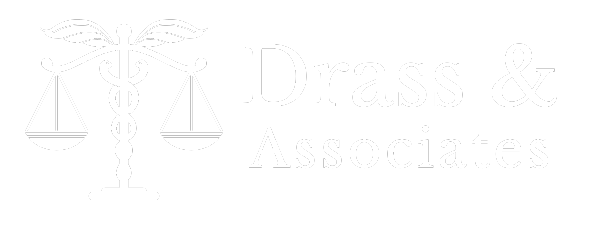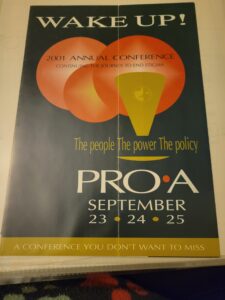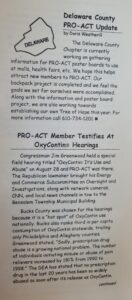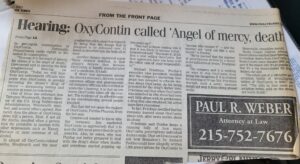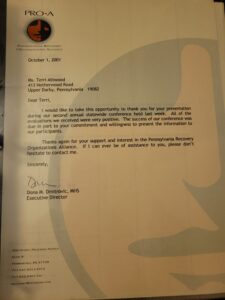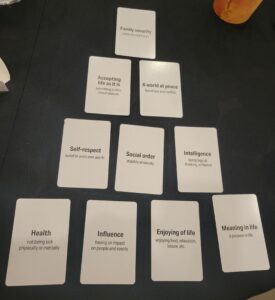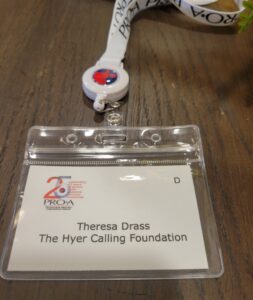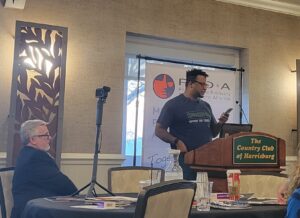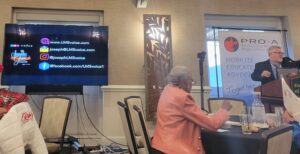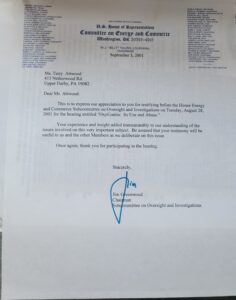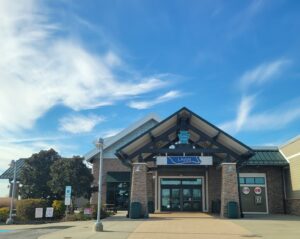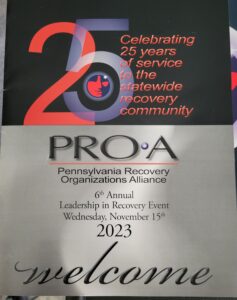The drive
It was a bright fall day with the sun shining and the leaves in their full colorful glory as I headed out west. A huge bald eagle swooped in right over me – a heavenly gift from my father. My heart was full, my mind was processing a million memories, and the stage was set for a wonderful day.
I had not driven out to Harrisburg to a PRO-A conference in 22 years. As I drove, I was also on a mental journey of retrospection and introspection.
I was initially led to a nursing career in behavioral health after witnessing a coworker hold a filthy dirty soaking wet mop over the face of a psychotic patient in crisis while restrained to the floor. For me, at twenty years old, that moment – fueled by all the personal trauma-filled moments that preceded it, ignited an advocacy fervor.
A few years later, my work around PRO-A (https://pro-a.org/) and PROACT (https://www.councilsepa.org/programs/pro-act/mcrcc/) started as I was mentored by Beverly Haberle in completing my Master of Human Services degree and writing my thesis, “The Role of an Advocacy Group in Addressing Drug Related Crime” at Lincoln University (https://www.lincoln.edu).
The People The Power The Policy
Having had been a direct care and utilization management nurse, and at that time, being the director of an adolescent/ adult dual diagnosis partial hospital program provided a context of social systems and healthcare needs that was ripe for assessment and intervention in meaningful alignment with the goals of the MHS curriculum.
As William Stauffer would comment later in the day, the late 1990s and early 2000s was “…a very dark era,” for the recovery movement. Opioid -oxycontin- use was on the rise, parity was a sick joke, and stigmatized, patriarchal greed was the norm.
The national recovery movement was mobilizing to end stigma, establish reasonable access to effective treatment, and create supportive and inclusive communities. Memories of the celebrated 2001 Recovery Summit in St. Paul, Minnesota, including meeting William White and drumming with members of White Bison came rushing back as I drove. (Along with the recollection of our plane being escorted by two fighter jets for a while on the ride home as 9/11 had just happened.)
These were the years, people, and paradigms that firmly entrenched my personhood, core memories, and basic abilities as a professional behavioral healthcare administrator and advocate.
The conference
As I pulled up the driveway and into my parking spot, I was so happy to see Kevin Hyer.
From the moment we first interacted on LinkedIn, Kevin has been entirely enthusiastically engaged, and engaging, as he embraces his recovery and uses his passion with purpose.
Kevin formed The Hyer Calling Foundation, Inc. “as part of his own higher calling: to break the stereotypes of addiction that reinforce the stigma which perpetuates it. In doing so, Kevin draws on his background in employment law and HR management to offer the recovery community a second chance at a career.”
Kevin’s decision to have The Hyer Calling Foundation be a sponsor for the conference is a point of pride for me. All over again, I am genuinely delighted to serve as Clinical Consultant to the foundation and to support its important work. Each opportunity to watch and support Kevin is purely actionable inspiration.
The conference included an informative, and much indicated, presentation with the Tobacco Recovery Panel including Tony Klein, Katie Gassner, and Cassandra Joy Drumheiser. More here: https://pro-a.org/tobacco-recovery/
Joseph Green of LMSVoice.com facilitated a powerful two hour workshop, “The importance of inclusivity in recovery spaces.” We explored the expansiveness of diversity, the impact of values, and the role of storytelling in being heard.
I was also thrilled and humbled to see some familiarly momentous faces, including Cecilia Velasquez, whose professional journey I have watched and admired throughout my own career.
I had often encountered Ms. Velasquez while participating in meetings and events that happened around the Recovery-oriented care system transformation implementation in Philadelphia under Dr. Arthur Evans. I also attended a Women’s Conference held by Gaudenzia, Inc., with her where I was able to learn about trauma and trauma-informed care from Dr. Sandra Bloom.
Reflecting on these historically impactful experiences and my fortune in being part of them in the moment renewed my sense of hope and thankfulness. Sharing them with Kevin and experiencing his present-day, positive, promising perspective – and potential- brings refreshed resolution.
We were pleased to touch base with our brilliant buddies, Whitney Menarchek of straightupcare.com and Sean Fogler of elevyst.com. Each of their endeavors are compelling and innovative projects that Kevin and I are intently appreciative to support.
Fittingly for the evening, there was a tribute to Dr. H. Westley Clark. “Dr. Clark is…formerly the Director of the Center for Substance Abuse Treatment, Substance Abuse and Mental Health Services Administration, U.S. Department of Health and Human Service, where he led the agency’s national effort to provide effective and accessible treatment to all Americans with addictive disorders.” (https://facesandvoicesofrecovery.org/people/h-westley-clark-m-d/)
Gratitude and Community
During dinner, we had an insightful conversation with some of our new colleagues, including Will Erdman of Chess Health, Michael Hess of Retreat Behavioral Health, and Jessica Northcott from the University of Pittsburgh. There were so many revolutionary ideas mentioned and so much impressive knowledge and grit there to make them happen!
At one point, we were talking about the work the new Dream Center near State College is doing to help formerly incarcerated people reestablish lives in the community. We got to the part where gratitude is so fundamental to success, and Kevin replied to a comment by looking at me, then turning back and saying, “Oh, Terri is all about the community and gratitude…” It was a profoundly defining and validating comment.
The Drive Back
Driving home, SiriusXM’s E-Street Radio gifted me with the most appropriate soundtrack of Bruce’s March 16, 2023 “Letter to You” show at the Wells Fargo Center.
“Letter to You” is an album, show, and tour of pure retrospection and introspection, and for many reasons, especially for me. I had the joyful privilege of witnessing my rainbow-baby granddaughter being born after over twenty four hours of labor on the morning of March 16, 2023; and I attended this show that night. First song? No Surrender. Coincidence? I think not.
To listen, click here: Bruce Springsteen – Letter to You
Conclusion
PRO•A was established in 1998 to give a voice and focal point to the statewide recovery community in Pennsylvania. They – and those of us who support and believe in their mission- faced and continue to face ugly, disheartening obstacles.
However, the progress that has been made elicits tremendous hope. In addition to successfully advocating for policy changes, recovery advocacy organizations like PRO-A also provide a variety of support services to people in recovery. These services can include peer support, case management, and employment assistance.
Recovery advocacy organizations also play an important role in improving communities through activities such as educating the public about substance abuse and addiction. They also do this through a variety of outreach and education initiatives, such as public speaking engagements, media campaigns, and community events.
The progress made by recovery advocacy organizations in Pennsylvania has had a significant impact on the lives of people struggling with substance abuse and addiction. These organizations have helped to increase access to treatment, reduce stigma, and promote recovery.
Judging from the solid dedication, ardent talent and vigorous energy I experienced on Wednesday, they’re just getting started and we are all better for it.
To donate, learn more, or explore ways you can help, click here: Pro-A’s Website
